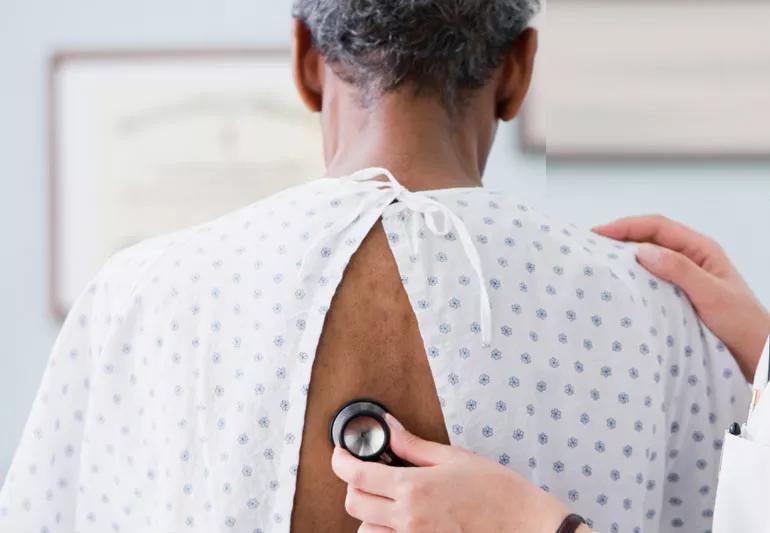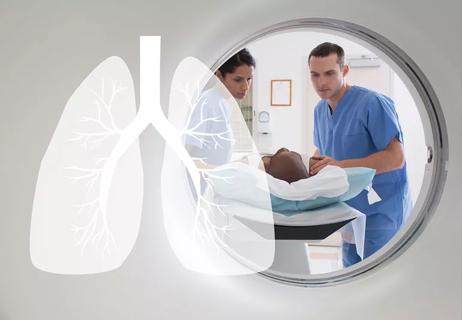Knowing the signs (like a cough that won’t quit) may help some people detect lung cancer early

Finding and treating lung cancer early usually leads to better results. Some people with early lung cancer may have symptoms, which can start them on the pathway to diagnosis and treatment.
Advertisement
Cleveland Clinic is a non-profit academic medical center. Advertising on our site helps support our mission. We do not endorse non-Cleveland Clinic products or services. Policy
But often, cancer has gone beyond the early stages before symptoms appear. This delay in symptoms is one reason why lung cancer claims more lives than any other cancer type.
“Knowing the warning signs may help you find lung cancer early,” says pulmonologist Peter Mazzone, MD. “But there are other important steps you can take. If you’re at high risk, you may be eligible for lung cancer screening to find cancer before you have symptoms. And if you smoke, quitting smoking can help reduce your lung cancer risk.”
Dr. Mazzone explains the warning signs to look for and when you should get screened or tested for lung cancer.
Symptoms of lung cancer can vary from person to person. The main symptom is a cough. “Most of the time, a cough is due to another condition,” says Dr. Mazzone. See a healthcare provider if you have a cough that:
Other symptoms of lung cancer include:
If lung cancer spreads outside of your lungs to other parts of your body, you may feel:
Advertisement
Whenever you feel “off” — when something just isn’t right — it’s a good idea to see a healthcare provider to get checked out. Unexplained pain, lumps, coughs or other symptoms could be signs of something serious.
Some lung tumors can cause groups of symptoms called syndromes. These symptoms could signal lung cancer:
A tumor in the upper lung can press on nerves to your eye and face, causing Horner syndrome. Symptoms typically affect one side of your face and include:
The superior vena cava is the large blood vessel that carries blood from your head and neck to your heart. A lung tumor pushing on the superior vena cava can cause this syndrome. The main symptoms are redness and swelling in your face and neck.
Some lung cancers produce hormones or hormone-like substances that travel through your bloodstream, causing problems far from the tumor. Paraneoplastic syndromes are more common in people with small cell lung cancer (SCLC).
There are several paraneoplastic syndromes. An example is a syndrome of inappropriate antidiuretic hormone (SIADH). In SIADH, cancer cells make an antidiuretic hormone (ADH), which lowers sodium levels in your blood. Low sodium levels can lead to:
Because the symptoms of paraneoplastic syndromes often seem unrelated, healthcare providers may not suspect lung cancer as a cause.
Whether you experience symptoms and when they occur may depend on the tumor’s:
For example, two of the most common types of non-small cell lung cancer (NSCLC) are squamous cell carcinomas and adenocarcinomas. Squamous cell cancer tends to occur toward larger breathing tubes, while adenocarcinomas are usually deeper in your lung.
“It’s not always the case, but a squamous cell tumor near a large breathing tube may be more likely to produce a cough with some blood in it,” notes Dr. Mazzone. “A deeper tumor of the same size may not cause any symptoms.”
Screening and testing have different purposes:
The U.S. Preventive Services Task Force (USPSTF) recommends lung cancer screening if you’re between ages 50 and 80 and:
Advertisement
Many people think they’re not at risk of lung cancer if they never smoked. But about 20% of people with lung cancer have no history of smoking.
Regardless of your smoking history, talk to a healthcare provider if you have symptoms with no known cause like:
Your provider will ask you about your medical history and perform an exam. They may order pulmonary function testing to check how well your lungs are working. Imaging tests, such as a chest X-ray or chest CT scan, are also helpful in diagnosing lung problems.
“Your symptoms may not be lung cancer, but they require a healthcare provider to check them out and discuss them with you,” states Dr. Mazzone.
Advertisement

Sign up for our Health Essentials emails for expert guidance on nutrition, fitness, sleep, skin care and more.
Learn more about our editorial process.
Advertisement

Lung cancer and treatment can take its toll, but support is available to help you live well

Getting your treatment plan just right can take some fine-tuning, but the appointments will taper off

Side effects like nausea and fatigue are common, but there are ways to feel better

Early detection through screening can improve survival numbers

Allergies, postnasal drip, asthma or reflux could be to blame for a cough that won’t quit

‘Walking pneumonia’ is milder and doesn’t always require medication — but it’s also highly contagious

Wearing a scarf, adjusting your outdoor activities and following your asthma treatment plan can help limit breathing problems

Vaping exposes you to thousands of chemicals, including many that are known to cause cancer and lung disease

Even small moments of time outdoors can help reduce stress, boost mood and restore a sense of calm

A correct prescription helps your eyes see clearly — but as natural changes occur, you may need stronger or different eyeglasses

Both are medical emergencies, but they are very distinct events with different causes